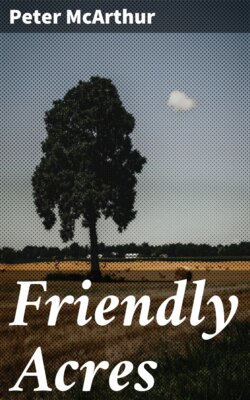Читать книгу Friendly Acres - Peter McArthur - Страница 17
На сайте Литреса книга снята с продажи.
Country Notes
ОглавлениеTable of Contents
The wonderful thing about the country is that so little of it ever gets into books. Poets write songs about it, but they do not lead people to go out and enjoy the country as the poet enjoyed it. On the contrary, we admire the music of his words, instead of admiring Nature. The poet may tell us what he finds in Nature, but instead of trying to find in Nature what he did, we study his book and try to find it there. And it is not there. Poems about the beauties of Nature make their appeal to indoor people, but to all who have enjoyed Nature they are always inadequate. Nature appeals to all the senses at once, and no form of art can do that. Even if you could combine poetry, painting and music and offer them in a perfumed hall they would still lack what is best in Nature. Beyond the appeal to the senses, Nature gives a sense of harmony that is beyond all the arts. The more we learn to appreciate Nature—especially in these glorious spring days—the more we feel that the arts are all for indoor people what have lost touch with all that is best in life. The arts build up a new form of life that needs interpreters and a vast overhead of learning and scholarship, but Nature yields her fullness to the simple, as well as to the wise.
The sheep changed their flannels this week and as the weather changed at the same time, I am afraid they are not feeling very comfortable. With wool at present prices, they were given a very thorough clip, and in spite of the pleasant proverb the wind has not been tempered to them. We have had the reliable north wind with which we have become quite familiar this spring, and I was sure they would catch their death of cold. I investigated to see that we had a proper supply of mustard and goose-oil in case I should have to put plasters on their chests and give them the proper dosing. But up to the present writing they seem to be doing very well, though they keep on the lee side of the buildings and of the hedge that runs along the road. They almost look uncanny in their present condition of undress. It is surprising to see what a small sheep emerges from the fleece when the shearing is done. The mother sheep look very little bigger than their lambs. By the way, as those lambs already have noticeable fleeces, I am afraid the warm weather will be rather hard on them. One warm day last week I noticed Mary Belle, with her mouth open, panting after a short run. What will it be like for her in August, when we have real heat? While speaking of the lambs, I am glad to report that my attempt at bone-setting proved fairly satisfactory. Strafe is able to gambol about much as usual, though he limps a little and is thinner for his experience. There is a lump on his leg where the bone knit and those who speak with authority say that although he is a fine lamb he must now be considered in the mutton class. But I am proud of the fact that my efforts preserved his leg for everyday use if not for show purposes.
As this has been the first sheep-shearing we have had on the farm in many years, I was interested to note the improvement. When the boys brought word that the shearers had arrived and were shearing the sheep I hurried to the barn to view the operation. As I approached I heard a sound like that of a cream separator, and was surprised to find that the shearing was being done by machinery. With these tame, modern sheep, shearing is not the exciting process it used to be. The legs of the creatures were not tied up in a bunch with a hame-strap to keep them quiet. The shearer merely made the sheep sit on her hind-quarters, while he tucked her head under his arm. He had a contrivance that looked like a small mowing machine, and was busily cutting swaths of wool along her sides. It was doubtless a great improvement on the old shears—the kind that memory associates with boyish haircuts. I have always thought of the shears by its Gaelic name, but it is past my power to spell it. It was imitative of the sound made by the shears when in use. If you take a pair of shears, close and open them and then try to pronounce the sound you hear, you will have the Gaelic name. It sounds something like "dwnguist." Pronouncing it is just as hard as it looks. One needs to be born to it. I found that they had an old-fashioned shears with them to clip off spots that the mower could not be put over safely, but it was very little used. I noticed that the new method of shearing leaves the sheep free from ridges that used to be prominent features of old-time shearings—and haircuts. I shouldn't wonder but they could cut hair with these new machines, but as I have never seen anything like them in even the most up-to-date barber shops they cannot be practical for haircutting. But they are certainly the proper caper for sheep-shearing.
